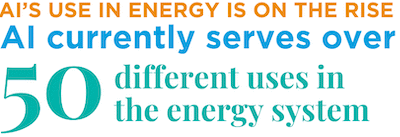As the world pivots from fossil fuels towards renewable energy sources such as solar, wind, battery storage, hydrogen and other forms of clean power, the role of Artificial Intelligence (AI) in this transition becomes increasingly critical. While AI helps to facilitate this shift, it also means that the energy sector requires new and innovative leaders who bring advanced technology skills, sustainability experience, and increased adaptability.

2024 Trends in AI, Energy, and Renewables
Mastering Predictive Analytics in Renewable Energy
Integrating renewables into electrical grids presents unique challenges, notably in grid stability and asset output prediction. AI emerges as a pivotal tool, enhancing grid management and fostering demand-side energy efficiency through advanced predictive analytics.
Predictive analytics also give insight into and facilitate energy efficiency, allowing for effective load shifting in response to demand fluctuations and emergency demand surges.

Maximizing Renewable Assets with AI
The longevity and performance optimization of renewable assets is crucial. Through machine learning, AI enables predictive maintenance and anomaly detection, while integrating IoT technologies facilitates continuous performance improvement.
AI is also at work in the oil & gas sector as operators embark on reducing GHG emissions in production processes, upstream, midstream/transportation and downstream refining and petrochemicals. While energy transition entails a migration away from fossil fuels towards carbon-free forms of energy, AI will play a central role in that journey, starting with compliance with Scope 1 & 2, and eventually including Scope 3 in the sector’s evolution. Can the industry move quickly enough?
Reinventing Grid Management through Advanced AI
Decentralized, intermittent renewable sources are transforming power grid management, similar to the way the cloud transformed data storage. AI plays a crucial role in power routing, frequency, and voltage stabilization, and also integrates electric vehicles into smart grids, enhancing efficiency and reliability.
Accelerating Renewable Technology Innovations with AI
AI significantly contributes to the development of cutting-edge energy storage solutions and efficiency technologies, influencing policy modeling and the design of more efficient wind turbines and grid-scale batteries.

Decarbonization and AI’s Role in Data Services
AI applications extend to decarbonization efforts and ESG reporting, providing critical data on carbon liabilities and supporting various energy sectors in their transition towards greener practices.
Talent Implications for 2024
As the energy sector transforms towards renewable sources, augmented by artificial intelligence (AI), the implications for talent acquisition, development, and leadership become increasingly important. This evolving landscape demands new skills, expertise, and leadership qualities.
The underlying currents of generational change in leadership and the workforce are of equal importance. As the balance of roles shifts toward renewable energy, traditional participants in the energy sector will be challenged to manage a generational ‘shift change’ in a manner that avoids shortages of the skills and experiences necessary to have the industry function in a safe and cost-effective manner. At the same time, newer entrants into the energy workforce are motivated by authentic corporate commitments to function responsibly in addressing sustainability and GHG emissions.

Leadership Skill Necessities in the Age of AI
The energy sector's leadership needs to evolve, requiring a blend of traditional expertise and proficiency in AI, IoT, and other emerging technologies. Leaders must navigate technological changes strategically, overcoming challenges related to AI risk, education, data quality, the ethical use of AI, and the opaque nature of AI algorithms.
Need for Advanced Technical Expertise at Every Level
The demand for AI, data analytics, and cybersecurity professionals is on the rise. Upskilling the existing workforce and maintaining a regular training regimen are essential steps for this sector in the face of evolving cybersecurity threats.
Emphasis on Sustainability Expertise
With an increasing focus on environmental impacts, the energy sector is seeing a surge in roles dedicated to sustainable practices, ESG compliance, and the governance of AI implementation, attracting talent from green energy and sustainable manufacturing sectors.
The Dynamics of Startup Leadership in Energy
Startup founders in the renewable energy space face unique challenges in scaling their ventures. Leadership within these startups must be agile, capable of navigating the intricacies of the energy transition, and adept at fostering innovation and growth.
The transition towards renewable energy powered by AI is reshaping the entire energy sector, demanding a new breed of leaders and a workforce skilled in both traditional and cutting-edge technologies. As we move into 2024, the interplay between AI, innovation, and talent will be pivotal in steering the global energy sector towards a more sustainable and efficient future.
Are you ready to upskill, hire, or develop your leaders to ensure success across this energy transition and AI’s increasing importance? Odgers Berndtson is here to help. Reach out to our Technology & Energy experts.




